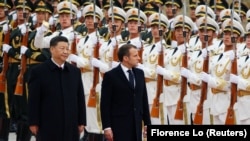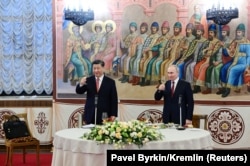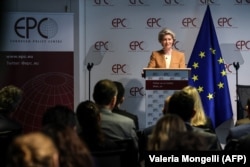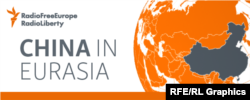French President Emmanuel Macron will go to Beijing for a three-day trip as the European Union grapples with its desire to pursue economic interests with China while dissuading Chinese leader Xi Jinping from deepening ties with Russia.
European Commission President Ursula von der Leyen is traveling with Macron to Beijing on April 5, where they will seek to strike a balance between EU geopolitical goals and its China-linked economic ambitions. They are expected to call on China to urge Russia to work toward a cease-fire in Ukraine and get Moscow to refrain from escalating its nuclear weapons rhetoric.
But the tightrope Europe is walking is becoming increasingly difficult, especially as Moscow's invasion of Ukraine and Beijing's position toward the war -- including China's moves to appear as a peace broker in the conflict -- reshape Brussels' ties with Beijing.
This shift was reflected in a March 30 speech by von der Leyen in which she called for a reassessment of the bloc's relations with China and warned that "we cannot close our eyes to the fact that China is not only an economic partner but also a systemic rival."
Macron, meanwhile, is looking to add a more personal touch to his discussions with Xi as part of an ambitious diplomatic push to create distance between Xi and Russian President Vladimir Putin -- who recently hosted the Chinese leader for a lavish state visit.
Speaking ahead of the visit to Beijing, Macron said his goal was to "try and involve China as much as possible to put pressure on Russia" on topics such as nuclear weapons, with aides saying Macron will try to gauge Xi's reaction to Russia's threat to host nuclear missiles in Belarus.
Macron's efforts will be closely watched by the international community, but EU officials told RFE/RL that expectations remain low for the visit, especially given that the French president has minimal leverage in talks and has not succeeded in previous diplomatic gambits, including to stop Putin from using military force in the run-up to the invasion of Ukraine or in a stalled bid to revive the Iran nuclear deal.
"[The EU] wants to underline the message [to China] to not support Russia any more than is already being done, otherwise the bilateral relationship is doomed," an EU official who was not cleared to speak to the media told RFE/RL. "History will show if all this traveling [to China] is a good thing or not."
A New Tightrope
Brussels' difficulty in striking a balance in its relationship with China is not new.
As a recent report by the Asia Society Policy Institute notes, the bloc remains "caught between the United States, which is pushing for a tough approach, and China, which is pushing for closer economic ties."
Those economic ties took a hit in 2021, when Beijing blacklisted a group of European lawmakers, experts, and diplomats over the bloc's placing of sanctions on four Chinese officials for rights violations in Xinjiang. The fallout from the incident led to an EU-China investment treaty being frozen and China's growing ties with Russia amid the war in Ukraine -- with Beijing emerging as one of Moscow's closest partners -- has worsened internal divisions within the EU on how to shape its China policy.
While Beijing has stopped short of providing Moscow with lethal military support for the war in Ukraine, China has extended a crucial economic lifeline to Russian and Chinese customs data, as well as documented reports, show the growing trade in dual-use commercial goods that are repurposed for military means.
EU officials say this leaves them with few good options moving forward. "The most important thing is what China doesn't do as opposed to what they do," an EU official told RFE/RL about Beijing's support for Moscow.
The 27-country bloc will continue to pursue cooperation with China on issues such as climate change, and the EU can't afford to alienate Beijing, which is a key trade partner and a major player in global affairs. But there is also a greater push within the EU for a stronger stand for its values and interests such as democracy, human rights, and the rule of law.
This had led to the European Commission taking a harder stance toward China as part of a "bad cop" approach, the European Council on Foreign Relations, a Brussels-based think tank, said in a recent report.
In March, the French president said that he had "suggested to von der Leyen that she accompany him to China" so they could speak "with a unified voice."
But the tougher approach risks backlash from Beijing that could throw off the bloc's delicate balancing act, as evidenced by the Chinese reaction to remarks by von der Leyen in a March 30 speech in Brussels.
Fu Cong, China's ambassador to the EU, told reporters afterwards that he was "a little bit disappointed" and said in an interview with the Chinese state-owned broadcaster CGTN that von der Leyen's speech "contained a lot of misrepresentation and misinterpretation of Chinese policies and the Chinese positions" and was written by someone who "does not really understand China."
China's Peace Power
The visit by Macron and von der Leyen comes on the heels of a similar trip to China by Spanish Prime Minister Pedro Sanchez, who also discussed the situation in Ukraine with Xi and urged the Chinese leader to discuss peace plans with Kyiv directly.
Ukrainian President Volodymyr Zelenskiy has repeatedly said that he is ready to speak directly with Xi, but the two leaders have not spoken since before Russia invaded Ukraine in February 2022. In the lead-up to Xi's March visit to Moscow, reports circulated that Beijing was ready to break its top-level silence, but a call with Zelenskiy did not materialize.
China has gone on a global public-relations push in the last month to paint itself as a country advocating for peace in Ukraine, with Beijing marketing a 12-point proposal that could open the door to peace talks. Western capitals have mostly shrugged off the document and criticized it as freezing the conflict along lines favorable to Moscow, but China's diplomatic push has received support from some countries in the Global South, such as Brazil, Kazakhstan, and South Africa.
Ukrainian Foreign Minister Dmytro Kuleba told the Financial Times during a March 29 interview that he believes that "China is testing the ground, in terms of the peace process" but that it hasn't yet made a decision on what role to play. He added that Chinese Foreign Minister Qin Gang assured him earlier in March that China would not provide weapons to Russia.
In going to Beijing, Macron is hoping to capitalize on China's desire to paint itself as a peace broker on the global stage, even if the path forward for him is increasingly narrow amid tensions with China and widespread protests in France after the increase of the retirement age -- issues that analysts say may diminish his standing with Xi.
In addition to visiting Beijing, Macron will also travel with Xi to Guangzhou, where the Chinese leader's father served as provincial governor. French officials have said they hope the side trip will allow for private, candid discussions between the leaders.










